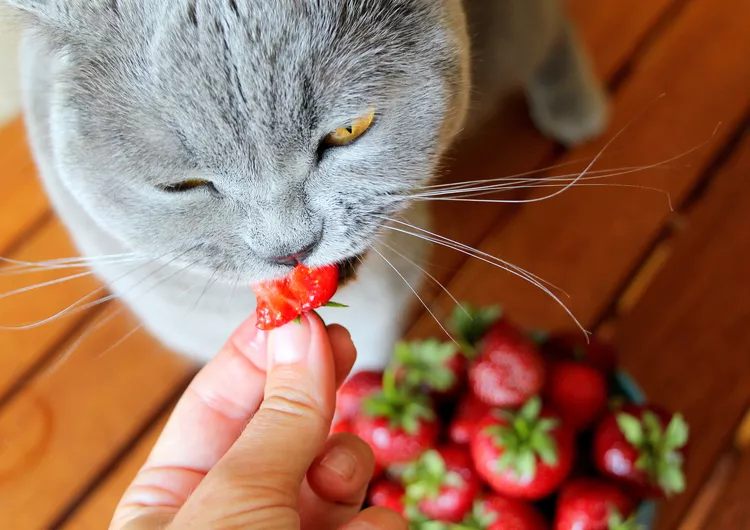
If you and your cat share a bit of a sweet tooth, you may be wondering—can cats eat strawberries? Yes, cats can safely eat strawberries, but that doesn’t mean they should get free access to a bowl of the fruit. Here are all the risks and potential benefits of strawberries for cats and how to safely share this fruit with your cat.
Strawberries are considered safe and non-toxic to cats. Because strawberries have a high sugar content, they are not a good treat option for your cat to eat regularly. However, an occasional strawberry is an okay treat for most healthy cats.
Strawberries don’t offer much to cats in the way of significant nutritional value. Strawberries are quite high in sugars, while your cat is an obligate carnivore who thrives on high-protein meals that contain meats. Strawberries do contain Vitamin C, folate, manganese, and potassium. The fruit is also considered a good source of antioxidants.
While the vitamins and minerals in strawberries are healthy for cats to consume, your cat should be having their daily nutritional requirements met by their complete and balanced commercial diet. They should not require an extra supplemental source to meet their needs.
Keeping in mind that strawberries aren’t particularly beneficial to your cat’s nutrition, most of the benefits of strawberries for your cat relate to your cat's mental stimulation. Trying safe novel foods can be a fun form of enrichment for your cat. If your cat ends up being a fan of strawberries, a small amount of strawberry can occasionally serve as a high-value reward when your cat performs a desirable behavior, such as performing a training trick you've been working on.
The risks of feeding strawberries to your cat include:
It’s not uncommon for cats to be intolerant of strawberries or other fruits that aren’t a regular part of their diet. Signs of digestive issues could include:
Strawberry allergies are not common in cats, but signs of an allergy to watch for include:
After introducing strawberries to your cat, make sure to monitor them closely for negative reactions to the fruit. If your cat develops mild gastrointestinal upset, you can usually safely monitor at home. In the unlikely event of an allergic reaction, seek emergency veterinary attention.
Although an occasional strawberry is a safe treat for most healthy cats, there are plenty of safe treats to choose from for your feline family member, including other fruits and commercial cat treats. Always feed treats in moderation and speak with your veterinarian before offering any human foods to your cat, especially if your cat has a food allergy, diabetes, or other chronic health condition.

75 Unisex Cat Names
Our gender neutral cat names perfect for your feline friend, with a diverse selection of fun and inclusive options to fit your pet's disposition.
Why Does My Cat Stink?
Is your cat stinky? Find out about the causes of bad odors in cats and when it is something to be concerned about. Learn how to help your stinky cat.
Signs of Rabies in Cats
Rabies is a fatal and contagious virus that can affect cats. Learn about the signs of rabies in cats and what to do about them.
Can Cats Eat Dog Food?
Can cats eat dog food? In small amounts, it's unlikely to be a problem, but long-term feeding of dog food to cats can cause health issues and malnutrition.
Exploring the Different Types of Pet-Friendly Beaches
Are you looking for pet-friendly beaches? Learn about the different types of pet-friendly beaches, their locations, and tips for visiting them with your pet.
Pulled Muscles in Dogs
A pulled muscle is one of the most common injuries seen in dogs. What can you do if your dog pulls a muscle and how can you prevent it?
Fibrosarcoma in Cats
Fibrosarcomas are potentially fatal soft tissue tumors that can occur in cats. Learn the causes, treatment, and prevention.
Alopecia in Dogs
Alopecia leads to hair loss and bald spots in dogs. Some breeds may be more at risk. Learn common causes, treatment, and prevention of dog alopecia.
Is Acetaminophen Safe for Dogs?
Acetaminophen is used by humans for pain and fever relief, but is it safe for dogs? Here's what you need to know before giving your dog acetaminophen.
Can Dogs Eat Almonds? Understanding the Risks and Guidelines
Can dogs eat almonds? While a couple likely won't hurt, it's best to avoid feeding your dog this nut. Learn the risks here.
Keeshond: Dog Breed Characteristics & Care
Learn about the keeshond dog, also known as the Dutch Barge Dog. This fluffy spitz breed was bred to guard, but also makes a friendly companion.
Is Rosemary Safe for Dogs?
Rosemary is used both for cooking and as a supplement with many reported health benefits in people, so you may be wondering if it is safe to give to your dog. Rosemary is considered non-toxic for dogs but with some caveats.
7 Hybrid Cats Breeds
Hybrid cat breeds can make appealing pets since they look more exotic than domestic house cats, but they aren't for everyone.
The Best White Cat Breeds to Keep as Pets
Several breeds can result in white cats with long or short hair. Find out the pros and cons of these white cat breeds.
11 Cute Pictures of Ragdoll Cats
Ragdoll cats are known for their beautiful coats and bright, blue eyes. Learn all about the breed, and check out some cute pictures here.
7 Reasons Why Your Cat Eats Paper, and How to Stop It
Is your cat eating paper? Learn why your cat is doing this, and find out how to put a stop to it.
Feist: Dog Breed Characteristics & Care
Feists are small, short-haired dogs developed to hunt squirrels and catch vermin. These high-energy, affectionate pooches make great companion animals.
Dogue de Bordeaux (French Mastiff): Dog Breed Characteristics & Care
Learn about the Dogue de Bordeaux, also called the French mastiff. Although large and muscular, they’re known for their calm and gentle personality.
How to Stop Your Dog From Fearing Men
Many dogs have a phobia of men. Learn how to help your dog overcome its fear through desensitization and training while keeping everyone safe.
Why Dogs Eat Poop and How to Stop Them
Is your dog eating poop? Some dogs do this because of stress or illness. Learn how to prevent stool eating, or coprophagia, in dogs.